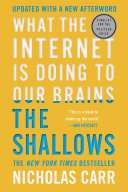

The book begins by examining how the internet, with its constant notifications and distractions, alters our ability to focus. Carr discusses various studies demonstrating that the brain's capacity to concentrate is diminished by the multitasking encouraged by online activities. He argues that the internet's design, which promotes quick access to information, leads to superficial browsing rather than deep reading. This shift in behavior affects cognitive functions, resulting in a decline in critical thinking and comprehension skills.
Continue readingCarr delves into the concept of neuroplasticity, which refers to the brain's ability to reorganize itself by forming new neural connections throughout life. He explains how the internet's influence can lead to physical changes in the brain, particularly in areas responsible for attention and memory. The book highlights research showing that heavy internet users may develop altered brain structures, which can impair their ability to process complex information and engage in reflective thought.
Continue readingOne of the central themes of 'The Shallows' is the decline of deep reading due to the internet. Carr argues that deep reading—engaging with text in a way that promotes understanding and retention—is becoming rarer as people increasingly skim content online. He discusses how this shift impacts not only individual cognition but also society at large, as collective critical thinking and cultural literacy diminish. The book emphasizes the importance of nurturing deep reading skills to counteract this trend.
Continue readingCarr places the current internet phenomenon within a historical context, comparing it to past technological advancements that have influenced human cognition, such as the printing press and television. He argues that each new medium has reshaped the way we think and process information. By understanding these historical shifts, readers can better appreciate the profound changes the internet brings to cognitive processes today.
Continue readingThe book discusses the concept of information overload, which refers to the overwhelming amount of information available online. Carr explores how this deluge can lead to confusion and decision paralysis, making it difficult for individuals to discern valuable information from noise. He presents evidence that information overload can hinder learning and retention, further exacerbating the challenges posed by the internet's influence on cognition.
Continue readingCarr highlights the relationship between the internet and memory, discussing how reliance on digital devices for information retrieval can weaken our memory skills. He explains that when we offload memory tasks to the internet, we may lose the ability to remember information independently. The book draws on cognitive psychology research to illustrate how memory works and how the internet's convenience can lead to a decline in our natural memory capabilities.
Continue readingIn the concluding sections, Carr speculates about the future of human cognition in an increasingly digital world. He raises concerns about the potential long-term effects of internet use on critical thinking, creativity, and problem-solving abilities. The book urges readers to be mindful of their online habits and to seek a balance between digital engagement and activities that promote deeper cognitive processing, such as reading books and engaging in face-to-face conversations.
Continue readingThe reading time for The Shallows depends on the reader's pace. However, this concise book summary covers the 7 key ideas from The Shallows, allowing you to quickly understand the main concepts, insights, and practical applications in around 19 min.
The Shallows is definitely worth reading. The book covers essential topics including The Internet as a Distraction, Neuroplasticity and Cognitive Change, The Loss of Deep Reading, providing practical insights and actionable advice. Whether you read the full book or our concise summary, The Shallows delivers valuable knowledge that can help you improve your understanding and apply these concepts in your personal or professional life.
The Shallows was written by Nicholas Carr.
If you enjoyed The Shallows by Nicholas Carr and want to explore similar topics or deepen your understanding, we highly recommend these related book summaries:
These books cover related themes, complementary concepts, and will help you build upon the knowledge gained from The Shallows. Each of these summaries provides concise insights that can further enhance your understanding and practical application of the ideas presented in The Shallows.